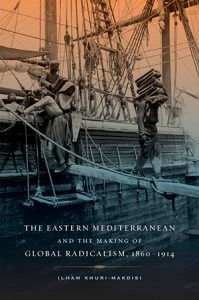The Eastern Mediterranean and the Making of Global Radicalism, 1860-1914

Author: Ilham Khuri-Makdisi
Publisher: University of California Press
Year of Publication: 2013
Print Length: 296 pages
Genre: Non-Fiction / History
Area: East Mediterranean, The Levant, Beirut, Lebanon, Cairo, Alexandria, Egypt, Ottoman Empire
Topic: Activism, Global Radicalism, Social Justice, Social Movement, Solidarity, Scholar & Activist, Scholarship & Knowledge, Movement of People and Ideas, Anarchism, Socialism, Imperialism
In this groundbreaking book, Ilham Khuri-Makdisi establishes the existence of a special radical trajectory spanning four continents and linking Beirut, Cairo, and Alexandria between 1860 and 1914. She shows that socialist and anarchist ideas were regularly discussed, disseminated, and reworked among intellectuals, workers, dramatists, Egyptians, Ottoman Syrians, ethnic Italians, Greeks, and many others in these cities. In situating the Middle East within the context of world history, Khuri-Makdisi challenges nationalist and elite narratives of Mediterranean and Middle Eastern history as well as Eurocentric ideas about global radical movements. The book demonstrates that these radical trajectories played a fundamental role in shaping societies throughout the world and offers a powerful rethinking of Ottoman intellectual and social history.
Table of Contents
Acknowledgments
Introduction
1. The Late Nineteenth-century World and the Emergence of a Global Radical Culture
2. The Nahḍa, the Press, and the Construction and Dissemination of a Radical Worldview
3. Theater and Radical Politics in Beirut, Cairo, and Alexandria 1860-1914
4. The Construction of Two Radical Networks in Beirut and Alexandria
5. Workers, Labor Unrest, and the Formulation and Dissemination of Radical Leftist Ideas
Conclusion: Deprovincializing the Eastern Mediterranean
Appendix
Notes
Bibliography
Index

Ilham Khuri-Makdisi is Associate Professor of History and Middle Eastern Studies at Northeastern University. She teaches courses in Middle Eastern history, World history and urban history. She is particularly interested in Ottoman Eastern Mediterranean cities in the late 19th, early 20th centuries and the movements of people and ideas, the global and intra-imperial links connecting the Ottoman Eastern Mediterranean to various parts of the empire and the world. She is currently working on a cultural and intellectual history of translations between Arabic and Ottoman Turkish in the late 19th and early 20th centuries, as well as other research projects situating the nahda (Arab Renaissance) within a larger Ottoman and global frame.
Source: https://cssh.northeastern.edu/faculty/ilham-khuri-makdisi/
More from Ilham Khuri-Makdisi in this library, click here.
